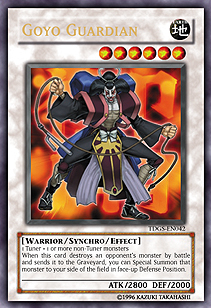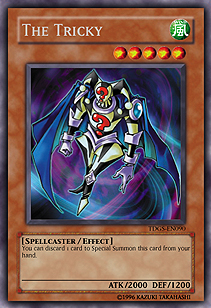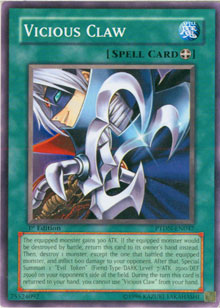 Our game is getting more complicated with each new set. New cards with effects that make you stretch your mind in order to accommodate or oppose them are the norm lately. New mechanics like Synchro summoning offer new ways for each player to mask his or her strategy. If you don’t know how to surprise your opponent then you have to rely on nothing but your hand’s strength. There’s a slight problem with that: your hand strength can vary depending on the consistency of your build and the quality of your shuffle. You need something extra to make up for poor draws or make good hands even better. Keeping your opponent guessing is one way to do that. What I’m offering this week are techniques to evaluate your own play so you can figure out what you can use to mislead your opponent. Part of game play is deck architecture and skill: the rest is mastering the art of misinformation.
Our game is getting more complicated with each new set. New cards with effects that make you stretch your mind in order to accommodate or oppose them are the norm lately. New mechanics like Synchro summoning offer new ways for each player to mask his or her strategy. If you don’t know how to surprise your opponent then you have to rely on nothing but your hand’s strength. There’s a slight problem with that: your hand strength can vary depending on the consistency of your build and the quality of your shuffle. You need something extra to make up for poor draws or make good hands even better. Keeping your opponent guessing is one way to do that. What I’m offering this week are techniques to evaluate your own play so you can figure out what you can use to mislead your opponent. Part of game play is deck architecture and skill: the rest is mastering the art of misinformation.
Evaluating Your Play
If you already read my articles on predicting metagames and if you’ve perused my work on deckbuilding and playing techniques, then the next logical step would be to systematically evaluate your play. Taking a look at how you play and searching for weaknesses is paramount because you can’t fool an opponent who can already read your plays with ease. A lot of duelists don’t take into account how they play or what they look like when they’re dueling. There’s more to this game than simply playing cards well.
The Yu-Gi-Oh! TCG has a psychological element that needs to be taken advantage of. There are many obvious reasons why you would not want to let your opponent get any hidden information from you, but I’ll name a few. 1) You don’t want to give the game away by means of your body language and other mannerisms. I’ve already written an article or two on body language so check them out if you haven’t seen them yet. 2) You want to confuse your opponent and cause him or her to make the wrong conclusions about your position in the game—this leads to bad plays on the opponent’s part. 3) You want to outsmart a better player in a game that you have a good chance of losing.
When you’re dueling it’s easy to believe that things go so fast you can’t possibly evaluate each play you make. That’s partly true. There is a certain extent to which you can monitor your own play. A typical game can have you making 25 to 30 different moves. Unless you have a stellar memory or are good with short-hand note-taking you’ll have to take a larger view. Since we have limitations on how much we can remember about any single game there are two perspectives that can help you evaluate your play. The first is the personal version. Evaluate your moves and your opponent’s, plus how you respond to them. Here are some  questions to ask:
questions to ask:
1. Is there a pattern to my plays?
2. Do I act a certain way when I am in a losing position?
3. Do I act a certain way when I am in a winning position?
4. How do I position my body in reaction to certain situations?
5. How do I treat my opponents in different situations?
6. Do I get frustrated at my own mistakes?
7. Do I get frustrated when my opponent capitalizes on my weaknesses?
I still do this often when I play. There will be moments when you respond in certain ways to specific events in the game. How you react to them emotionally or through your plays tells a shrewd opponent a lot about you. Whatever you’re inadvertently communicating to your opponent can often leave you as open as a book. When your opponent can read you accurately, you’re in trouble and nothing you do will come as a surprise to him or her. You can hit "open book" status in a variety of ways, depending on your opponent.
The first question, "Is there a pattern to my plays?" is extremely important because automating (repeating the same plays over and over again) can help your opponent more than it helps you. I personally despise "socially acceptable" plays, or "canned plays" as I call them. They’re the ones generally accepted by the community at large that you make only because everybody says they’re good. Obviously some plays are good: what I’m against are plays made by a player simply because he or she sees other duelists doing it with certain decks. These plays are the easiest to spot, counter, and predict. In my opinion, they set you up for failure against better opponents who study such patterns. It would be better if you thought about your plays instead of just making them because you saw someone else do it. Try to understand the plays you make and why they are good or bad.
The second way to evaluate your plays is to have someone watch you. My friends and I experimented with this technique. When we used it, our performance in tournaments improved dramatically in a short period of time. With this technique, you have two players and one objective observer who watches one player at a time. This observer is to be regarded as invisible and he or she takes notes on your plays, reactions, mistakes . . . the complete chain of events that lead to a loss or win. The note-taking has to be as meticulous as possible. Both players and the observer have to be willing to discuss the observations with piercing honesty. You repeat this process match after match until improvement is seen. We measured improvement by the number of mistakes made during each game, and judged mistakes by how they negatively impacted the player after he or she made them. This could be immediate (the turn after) or delayed (four or five turns later). It’s up to the observer to notice these misplays, which can be relatively minor. This technique is very rewarding for both the observer and the players being watched. Going through a series of events and tracing it back to a root play or situation is fun and eye-opening for those up to the challenge. I highly encourage you to try it.
Capitalizing on Your Opponent’s Position
Let’s say you’ve trained hard and learned how you play and react to game situations. You’ve perfected techniques to mask your intentions and have become quite adept at fooling your opponents. So what happens when you cause your opponent to make a misplay due to your ability to hide information? You capitalize. What do I mean by that? Figuratively speaking, I mean kicking your opponent while he or she is down. The whole point of hiding information,  forcing a misplay, or learning how to spot a misplay is to capitalize on it when you do. If you can’t, then you miss a golden opportunity to win the game. You can tip most duels in your favor with one play: noexaggeration. The Yu-Gi-Oh! TCG is a very fast-paced game and it requires a correspondingly quick wit. The scales can shift radically if you’re not careful. Because of this, when you have an opportunity to get an edge over your opponent, you’d better seize it for all it’s worth.
forcing a misplay, or learning how to spot a misplay is to capitalize on it when you do. If you can’t, then you miss a golden opportunity to win the game. You can tip most duels in your favor with one play: noexaggeration. The Yu-Gi-Oh! TCG is a very fast-paced game and it requires a correspondingly quick wit. The scales can shift radically if you’re not careful. Because of this, when you have an opportunity to get an edge over your opponent, you’d better seize it for all it’s worth.
To be frank, you have to be ruthless. You have to be unyielding like a pit bull. Note that this is different from when you make the "killing blow" in the game and you keep rudely executing your moves after your opponent starts packing up his or her cards for game 2: that’s just bad sportsmanship. What I’m stressing is that you should not give your opponent an opportunity to recover from his or her mistakes. You have to punish the opponent for it through game play. As an analogy, you can usually recover after you trip over something slightly. What you need to do (figuratively speaking) during tournament play or practice is to simply push your opponents as they’re tripping over themselves so they fall on their faces. You may have some apprehensions about doing this for a number of reasons. Don’t pay any attention to them. If you’re serious about winning in tournament play, this is what you have to do. Sometimes your opponent will start vocally complaining about how badly his or her game is going. I’ll leave you to judge for yourself whether it’s genuine or not, but generally speaking the more angry the opponent gets, the better off you are. He or she may not like you for a while, but it’s a game and someone’s got to lose. Better that it’s not you.
This applies best in the context of testing. One of the worst predicaments for a deck is the inability to capitalize on an opponent’s mistake. For example, let’s say you’ve built a deck that goes against the grain. It’s not a typical strategy for the expected metagame and it can catch your opponents off guard with some whiz-bang combo. However, when you catch the opponent off guard he or she still seems to get an edge over you in the end. All things being equal, this is probably because your deck can’t deliver when it needs to. This is the tragedy of a lot of obscure, creative decks. They feature innovative approaches to the game, but don’t win often enough to be worth further consideration. A deck needs capitalize on the game-winning opportunities it creates. There could be tons of reasons why it can’t accomplish this goal: lack of card efficiency, over-committing, bad concept, and dozens more. Don’t let this happen to you.
Final Thoughts
Take careful consideration of how you play and what you do when something happens in the game. Don’t be too hard on yourself: don’t harshly criticize yourself for having any kind of response, emotional or otherwise. The premise is to simply observe what you do and how your opponent responds to it. An angry response to an unfavorable situation can be a clever feint.
Another thing to remember: capitalize, capitalize, capitalize. Take advantage and use the opportunities you create during game play. Don’t just settle for a slight advantage: turn it into a huge advantage. Use every form of leverage you can to win (within the rules of the game and the boundaries of good sportsmanship, of course).
Until next time, remember to stay focused and have fun!
—Bryan Camareno